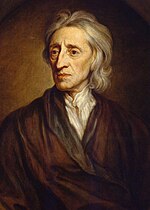
John Locke (August 29, 1632 – October 28, 1704) was an influential English philosopher. In epistemology, Locke has often been classified as a British Empiricist, along with David Hume and George Berkeley. He is equally important as a social contract theorist, as he developed an alternative to the Hobbesian state of nature and argued a government could only be legitimate if it received the consent of the governed through a social contract and protected the natural rights of life, liberty, and estate. If such consent was not given, argued Locke, citizens had a right of rebellion. Locke is one of the few major philosophers who became a minister of government.
Locke's ideas had an enormous influence on the development of political philosophy, and he is widely regarded as one of the most influential Enlightenment thinkers and contributors to liberal theory. His writings, along with those of many Scottish Enlightenment thinkers, influenced the American revolutionaries as reflected in the American Declaration of Independence.